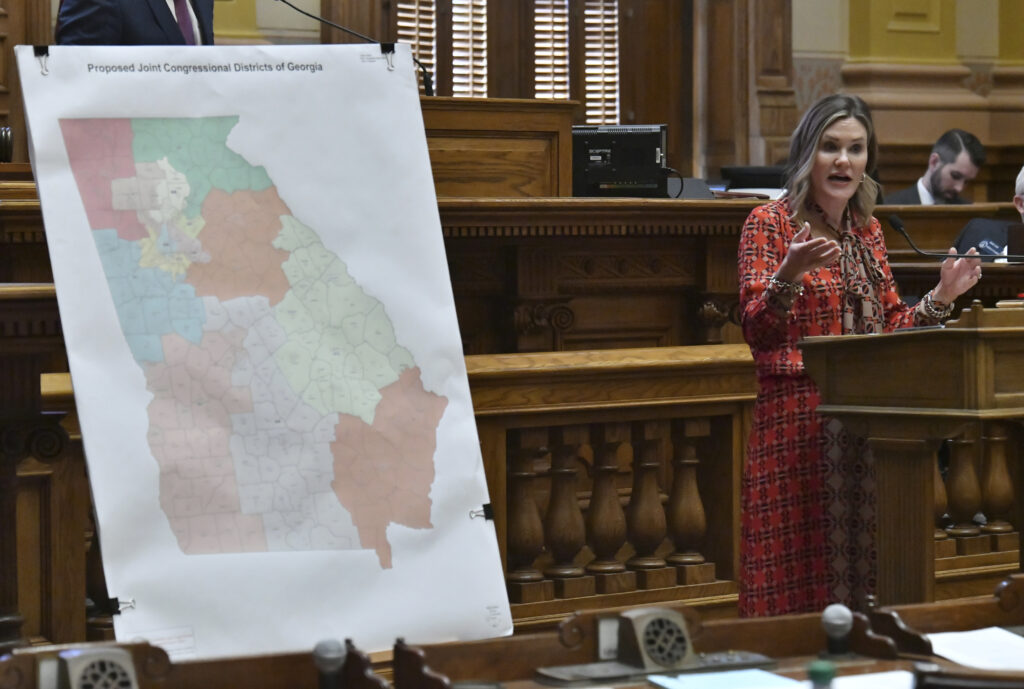Federal Judge Orders New Congressional and Legislative Maps in Georgia
WASHINGTON, D.C. — On Thursday, Oct. 26, a federal judge struck down Georgia’s legislative and congressional maps after finding that the maps violate the Voting Rights Act (VRA). Georgia will be required to draw a new congressional map that includes an additional majority-Black district and state legislative maps containing seven additional majority-Black districts before the 2024 election.

This major voting rights victory stems from three lawsuits challenging the Peach State’s congressional and legislative maps: Pendergrass v. Raffensperger (congressional), Grant v. Raffensperger (legislative) and Alpha Phi Alpha Fraternity Inc. v. Raffensperger (legislative). After the legislature enacted new maps in 2021, Black voters in Georgia filed lawsuits challenging the state’s congressional and state legislative maps for diluting the voting strength of Black voters and therefore violating Section 2 of the VRA. A trial was held from Sept. 5-14.
Today, a federal judge struck down the maps finding that “In light of this fact and in conjunction with all of the evidence and testimony in this case, the Court determines that Georgia’s congressional and legislative maps violate Section 2 of the Voting Rights Act and enjoins their use in any future elections.”
To remedy the VRA violations, Georgia must adopt the following districts by Dec. 8:
- One additional majority-Black congressional district in west-metro Atlanta;
- Two additional majority-Black Senate districts in south-metro Atlanta;
- Two additional majority-Black House districts in south-metro Atlanta;
- One additional majority-Black House district in west-metro Atlanta and
- Two additional majority-Black House districts in and around Macon-Bibb.
In the wake of Alabama’s unprecedented defiance in refusing to comply with a court order to add a second Black-majority district, the court also makes it incredibly clear that it will not accept similar delays or acts of defiance. “This timeline balances the relevant equities and serves the public interest by providing the General Assembly with its rightful opportunity to craft a remedy in the first instance, while also ensuring that, if an acceptable remedy is not produced, there will be time for the Court to fashion one—as the Court will not allow another election cycle on redistricting plans that the Court has determined on a full trial record to be unlawful.”
If the Legislature does not take the necessary steps to remedy these violations by Dec. 8, the court will take over drawing the map as was done in Alabama when the state refused to do so.
In addition to striking down the current congressional and legislative maps, the court also firmly rejected some of the state’s most radical and unfounded arguments. The court rejected the state’s argument that a private right of action does not exist under Section 2 of the VRA since “the Court has already determined that a private right of action under Section 2 exists.” In addition, the court rejected the state’s argument that Section 2 is not constitutional holding that “the Supreme recently rejected the same argument urged by the State of Alabama in Allen v. Milligan…Accordingly, the Court concludes that there is no merit to the affirmative defenses challenging the constitutionality of Section 2 in the cases pending in this Court.”
This decision is a major victory for Black voters in Georgia as they will be given the opportunity to elect candidates of their choice in an additional congressional district and several state legislative districts. After the U.S. Supreme Court’s decision in Allen this summer, the decision was expected to have a reverberating and largely positive impact on active redistricting litigation involving Section 2 claims across 10 different states. From Alabama to Georgia, two additional majority-Black districts will be added in time for the 2024 elections, and Section 2 challenges to congressional maps in eight other states are still ongoing.
This decision is also a victory for Section 2 generally as attempts to harm the important legislation were once again rebuffed. The 516 page opinion aptly concluded:
The Court reiterates that Georgia has made great strides since 1965 towards equality in voting. However, the evidence before this Court shows that Georgia has not reached the point where the political process has equal openness and equal opportunity for everyone. Accordingly, the Court issues this Order to ensure that Georgia continues to move toward equal openness and equal opportunity for everyone to participate in the electoral system.
Learn more about the cases here.
Learn more about the reverberating impact of Allen v. Milligan here.